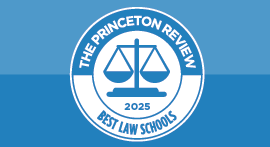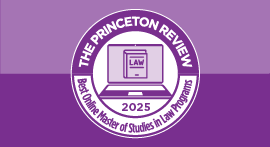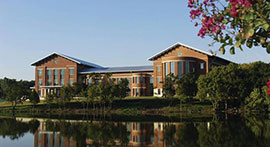Overview
Test Scores
(enrolled students)
Deadlines
Application Process
Other Admission Factors
LSAT Score
Undergraduate GPA
Letters of Recommendation
Essay / Personal Statement
Selectivity Rating
Faculty Information
Students Say
Some of the “classes are very large [during the] first year” but faculty members are “very accessible” and they generally manage to “turn dull information into lively debate.” “The professors make all the reading and writing worthwhile,” encourage “diverse points of view, and [take] an interest in students’ academic, professional, and personal lives,” gushes a 3L. Professors are also “extremely accomplished” and they “bring fantastic experience and knowledge to the classroom.” Often, though, “the ‘big-name’ professors are the worst teachers because they just tell war stories that are irrelevant to the exam, albeit interesting.” Some students tell us that the top brass is “hardworking” and “surprisingly accessible for a big school.” “They definitely make a very conscious effort to make the school seem smaller,” opines a 1L. Other students say that “a ton of red tape” plagues Georgetown. “It seems like nothing is ever done on time,” they say, and the registrar is “sloppy and inefficient.”
Career Services staffers are “far from uber-helpful life coaches,” and “there is a general feeling among the student body that Career Services is more interested in statistics (e.g., how many students went to big firms) than in helping students find paths that will make them happy.” An optional first year program titled The Search Before the Search (SBTS) encourages students to reflect on their own strengths and interests while providing insight into the myriad opportunities available to Georgetown law graduates. The Georgetown brand has “an amazing domestic and international presence,” though. “A huge range of firms and government agencies” recruits on campus each year. The pool of alumni is colossal. “Georgetown has amazing support for public interest students” as well, including a stand-alone office tailored to help them “pursue careers and co-curricular options.” The biggest chunk of graduates stay in Washington, D.C., or head to New York City or California. About 50 percent go into private practice.
“The facilities are comfortable and more than adequate” here. Classrooms “are in great condition.” The five-story law library is “enjoyable to spend time in and has plenty of nooks and crannies.” The law school is located “away from the main campus.” But “ the proximity to SCOTUS (The Supreme Court), the Capitol, the White House, and the many international institutions in D.C. make for a special experience.”
Career overview
Career Services
Graduates Employed by Area
Graduates Employed by Region
Prominent Alumni
Dates
Financial Aid Statistics
Expenses per Academic Year
Student Body Profile
Demographics
Campus Life
Students Say
Academically, there are “those few students with an exceptionally competitive attitude” but, for the most part, “students share notes, help each other, and actually want to work together.” “I would say the level of competition is moderate,” estimates a 1L. Outside of class, “extracurriculars are very popular.” “There are plenty of student organizations and there are always more activities on campus than are possible to attend.” “Famous speakers” are ubiquitous. Supreme Court justices “pop by all the time,” for example. The swanky, “state-of-the-art” fitness center is a “great escape from studying” and it’s exclusively for law students. Amenities include a swimming pool, racquetball courts, a full-size basketball court, and whirlpools. You can also take classes in spinning, yoga, dance, boxing, and much else. “A lot of the student body commutes from a good distance to school,” but “there is a buzzing social scene, particularly among 1Ls.” On the weekends, “students tend to go en masse to Dupont Circle and other parts of D.C.”
More Information
Admissions Office Contact
Dean of Admissions
Room 589
Washington, DC 20001



